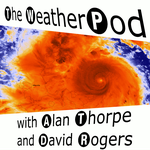Episode 26: Anticipatory Action
In this special episode of the WeatherPod, hosts Alan and David have invited into the studio Irene Amuron of the Red Cross Red Crescent Climate Centre, Paul Davies of the UK Met Office, and Terrence Fernando the University of Salford, to debate the question: “How do we improve outcomes for everyone at risk from the impact of hydrometeorological hazards?”
Societies are increasingly challenged by the need to cope with complex interconnected threats. Either a single hazard leads to a cascade of additional perils, often more significant effects than the primary one, or multiple independent hazards occur simultaneously. In each case, lack of planning and early preparation leads to the realisation of major adverse impacts on people and their livelihoods. Economic development may falter, and political instability becomes an added risk.
Climate change compounds existing threats and poses new ones; many, outside the bounds of experience, require us to harness new knowledge and take a more holistic view of the immediate and future risks facing us. The problem affects all of society and a “whole of society” approach is needed. This is immensely challenging. Societal compacts and partnerships among more than a few groups of stakeholders are rarely sustained and we proceed with compartmentalised approaches where each sector attempts to solve its own problems with little or no insight into how sectoral interdependencies compound and exacerbate risks or how to reduce them.
Two key concepts have emerged in the past decade as the means to improve people’s ability to handle different types of hazards – Anticipatory action and impact-based forecasting. Anticipatory action is a set of actions people can take to prevent harm to themselves and others before acute impacts are felt. Impact-based forecasts focus on what the hazard will do rather than what the hazard will be. In practice, anticipatory action and impact-based forecasts are complementary. Neither is effective without the other. “Good forecast but shame about the outcome” is a repeated mantra. So, for those impacts of hazards for which anticipatory action driven largely or in part by weather forecasts would make a difference, what isn’t being done right?
Irene Amuron is Head of Anticipatory Action at the Red Cross Red Crescent Climate Centre.
Paul Davies is Principal Fellow, Meteorology and Chief Meteorologist at the UK MetOffice.
Terrence Fernando is Director of the THINKlab at the University of Salford.
Theme music by John Cockram
Hosted on Acast. See acast.com/privacy for more information.


